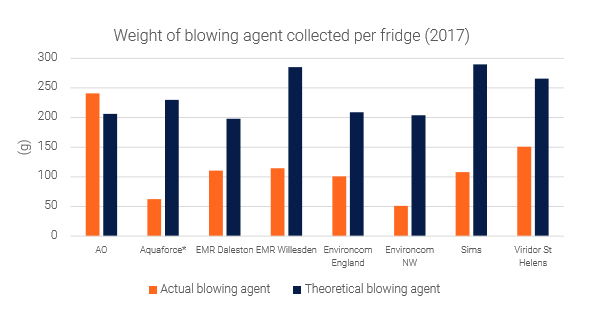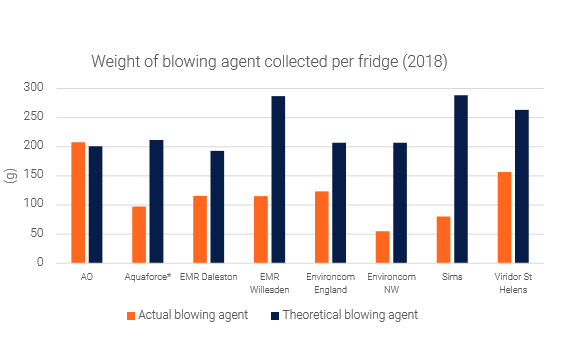The report was conducted by the independent consultancy firm Anthesis, and assessed whether plants looked to have met the treatment standards required by legislation for the capture of gasses in the 2017 and 2018 calendar years.
However, the report did not include responses from four facilities in the UK, including the Gap Group’s plant in Gateshead as it was constructed after the reporting period, and also Viridor’s plant in Perth, as it falls under the jurisdiction of the Scottish Environment Protection Agency (SEPA).

Data from Clear Circle’s plant in Northern Ireland was “not requested” and eSynergy in Leicestershire “has not provided any returns to the EA”, the report said.
Capture
Of the eight which were tested, Anthesis reported a 100% capture rate of targeted greenhouse gasses over the two years at AO.com’s plant, while Viridor’s St Helens Facility came joint second with EMR’s in Walsall, recording a 58% average rate.
The eight plants combined released more than 415,000 tonnes of gasses into the atmosphere.
The data from the Anthesis study was gathered from “all available periodic reports for 2017 and 2018 from UK fridge recyclers, via Freedom of Information requests, and from the Environment Agency,” and National Resources Wales, according to Anthesis.
Regulations
In 2002, the Ozone Depleting Substances Regulations (ODS) were introduced in the UK, to regulate the use of specific substances in household fridges and freezers.
These regulations made it illegal to “dispose of fridges in a way that releases emissions into the atmosphere, ensuring that they are recycled by appropriately licensed operators,” Anthesis said.
The report – commissioned by AO Recycling – examined the environmental permits of all the plants in the UK and calculated how many grams of blowing agent each plant theoretically should have captured from the recycling process.
As outlined below, some operators appear to have fallen short for the two years, leading to Anthesis to express concerns that the sector as a whole is “underperforming”. But, Anthesis did, however, say that some data is distorted by highly variable rates of damaged units which are discounted from the calculations.


The report gave three further potential explanations for lower performances, as outlined below:
- Most UK fridge recycling plants do not collect enough blowing agent or refrigerant through their treatment processes
- There are mistakes in UK fridge recycling reporting to the competent authorities, which exaggerate poor performance
- The theoretical values for blowing agent in fridges from the fridge recyclers’ environmental permits are no longer representative
Anthesis noted in the report that “while it is clear that there are mistakes in the reporting, consistent and universal misreporting is unlikely.”
The consultancy firm added: “There are also isolated examples of high performance in the recovery of blowing agent, which suggests that the theoretical values from environmental permits are achievable.”
Investment
Commenting after the report was released, John Roberts, AO’s chief executive, said the company was investment £10 million into the plant to ensure it’s efficiency. “We invested £10million in a recycling plant to make sure we were in control, meaning AO customers can be safe in the knowledge that their products are recycled to the right standard.”
WEELABEX
When approached by letsrecycle.com, a Viridor spokesperson said: “Viridor’s St Helens WEEE facility, is one of very few of the Environment Agency classified Approved Authorised Treatment Facilities (AATF) to have also achieved, and been reaccredited, under the stricter European WEELABEX processing recovery requirements.”
Related links










Subscribe for free